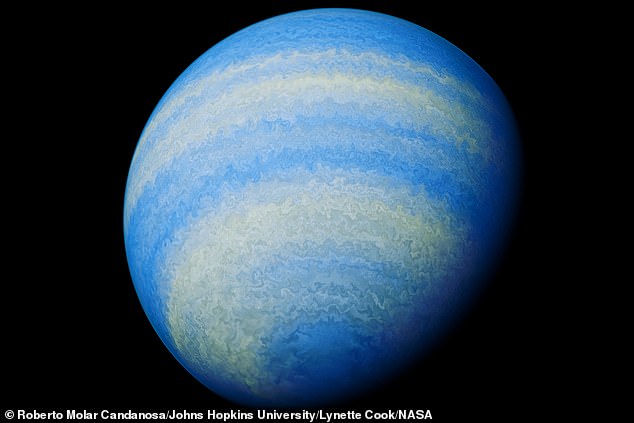Scientists discover Jupiter-sized exoplanet 64 light-years away that ‘smells like rotten eggs’
- Jupiter-sized gas giant contains hydrogen sulfide in its atmosphere
- This molecule spreads the smell of rotten eggs – even at low concentrations
There’s nothing as pungent as the smell of rotten eggs.
Imagine a huge planet that stinks of that stuff.
Astronomers have discovered a Jupiter-sized gas giant that contains traces of hydrogen sulfide in its atmosphere.
This molecule spreads the smell of rotten eggs, even at low concentrations in the air.
But while the discovery may come as an unpleasant surprise, it also offers scientists new clues about how sulfur – a building block of planets – could influence the composition of gaseous worlds beyond the solar system.
Astronomers have discovered a Jupiter-sized gas giant that contains traces of hydrogen sulfide in its atmosphere.
The planet, called HD 189733 b, is located 64 light-years from Earth and was first discovered in 2005.
It is an exoplanet, meaning the planet orbits a star outside our solar system.
The giant is notorious for its deadly weather conditions, with a foggy, burner-induced atmosphere filled with glass clouds and scorching temperatures of up to 970 degrees Celsius.
Because it is the closest ‘hot Jupiter’, it is a reference planet for detailed studies of exoplanetary atmospheres.
Researchers from Johns Hopkins University analyzed data collected by the James Webb Space Telescope as part of their new study.

The planet, called HD 189733 b, is located 64 light-years away from Earth and was first discovered in 2005
Observations using infrared waves revealed the composition of the atmosphere.
Lead researcher Guangwei Fu said: ‘Hydrogen sulfide is an important molecule that we didn’t know existed.
‘We had predicted it and we know it’s on Jupiter, but outside the solar system we hadn’t really discovered it yet.
‘We’re not looking for life on this planet because it’s too hot, but finding hydrogen sulfide is a stepping stone to finding this molecule on other planets and to understanding how different types of planets form.
‘Sulfur is an essential element for building more complex molecules and – like carbon, nitrogen, oxygen and phosphate – scientists need to study it further to fully understand how planets formed and what they are made of.’
In the coming months, Dr. Fu’s team aims to map the presence of sulfur in more exoplanets and investigate how high sulfur levels affect the proximity to their parent star.
“Suppose we examine another 100 hot Jupiters and they all contain sulfur,” Dr. Fu said.
“What does that mean for how they formed and how they evolve differently from our own Jupiter?”
The findings are published in the journal Nature.
